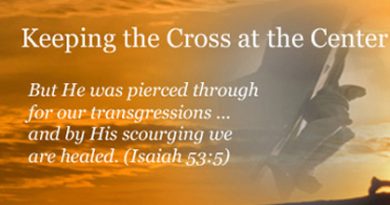Forgiveness: When Hope Dies
Mark 16:10 …they were mourning and weeping.
When Jesus dies so do the dreams of those who counted on Him. No Sabbath joy this week – just Sabbath sorrow. Blackness, bleakness, numbness, and tears. A dead body and dead hopes. A lifeless body and lifeless hearts.
Forgotten Promises … Forgotten Power
Dark hours make God’s promises seem unreal. When Jesus dies, the disciples’ hope dies. They watch for hours until He finally breathes His last, pry nails out of His lifeless flesh, hear the heavy stone thud into place and seal Him in the tomb – perceivable horrors assault their senses and shove Jesus’ promises into the background. He’d told them He’d die; He’d told them they would weep – this they remember. But He’d also promised them He’d be raised; He’d promised they would see Him again; He’d promised their sorrow would be turned to joy – all this they seemingly forgot. ((Matthew 16:21, Mark 20:19, Luke 9:22, John 16:16-20). In those bleak hours between crucifixion and resurrection, the gospel texts record only their sorrow. There’s no hint that any of them remember Jesus’ promises or use those promises to connect with hope and help each other hope.
God’s power over death seems forgotten as well. You would think they would have known that God has power over death. Didn’t they remember the times Jesus brought the dead to life? The widow’s dead son, Jairus’ dead daughter, His own dead friend, Lazarus (Luke 7:13-15 and 8:52-56, John 11:43-44). Remembering might have given them hope. But there’s no mention of hope. Pain fills their awareness … and their hope dies.
How like us! We do the same. Pain’s presence effectively erases our memories as well; its intensity fills our awareness and we too forget the Lord’s promises and His power. Both seem unreal. And our hope dies.
Bringing Hope to Life
When our expectations get dashed to pieces, when all we’ve anticipated disappears, when the story we’ve planned evaporates – what then? How do we go on when hope dies? In Real Presences, George Steiner writes, “Ours is the long day’s journey of the Saturday.” We do, in a sense, live in a Saturday, but it need not be a Saturday without hope.
I have several friends who are facing ongoing serious suffering, either their own or that of a loved one. Hope recently surprised one of them. (I say surprised, because hope often comes from unexpected places at unexpected moments.) She’d asked for her loved one’s healing – that would be a wonderful display of God’s grace. She’d yielded to the Lord taking them home – that would be an acceptable display of God’s grace. But ongoing disability? That was unacceptable to her. Then the Lord surprised her with a promise He breathed into her heart: He let her know that His grace would continue even if the disability continued. And that promise brought her hope. Physical disability would not rob life of richness; joy could come in the midst of even this sorrow.
Paul said much the same:
2 Corinthians 12:9-10 9 And [the Lord] has said to me, “My grace is sufficient for you, for power is perfected in weakness.” Most gladly, therefore, I will rather boast about my weaknesses, that the power of Christ may dwell in me. 10 Therefore I am well content with weaknesses, with insults, with distresses, with persecutions, with difficulties, for Christ’s sake; for when I am weak, then I am strong.
Paul knew, and remembered, what we forget. Suffering, if we allow, brings us intimacy with God. How? By bringing us to the end of our own resources and causing us in desperation to depend on Him. We cry “Help!” – and God always says “Yes!”
There’s suffering … and then there’s suffering. Suffering without hope is suffering almost beyond bearing. But suffering with hope? That’s quite different. Suffering with hope can be borne. It can even be accompanied by joy.
How do we suffer with hope? We remember God’s promises and His power. The Lord may whisper to our hearts or remind us through His written word. He may provide another person to help us remember. But remember we must. Suffering with hope requires remembering. It also requires re-doing our priorities. We need to ask the Lord to cause us to yearn for His story above the story we write for ourselves; we need to value character over comfort; we need to ask Him to teach us to trust (as did Jesus) that God’s story, difficult as it may be, is always the best story.
A Prayer
Lord, show me your promises that I need to remember. Show me where I doubt your power to bring life out of death. Reveal to me where your and my priorities differ. Teach me to think like you think, value what you value, and trust that your story for my life is the best story. Fill me with hope.
Forgiveness: When Hope Dies
© Lynne Fox, 2015
biblegrapes.com



Lynne,
So very true. Hope in GOD’s grace & promises makes suffering bearable. Thanks 🙂